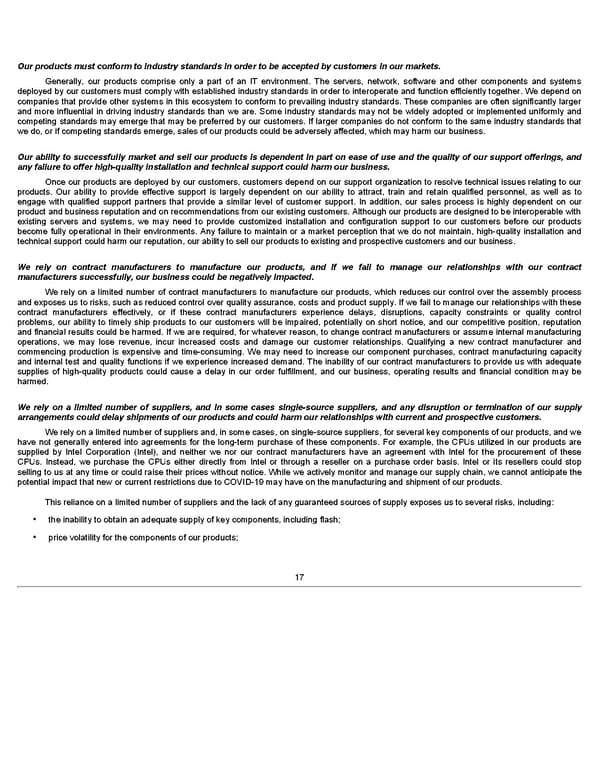Our products must conform to industry standards in order to be accepted by customers in our markets. Generally, our products comprise only a part of an IT environment. The servers, network, software and other components and systems deployed by our customers must comply with established industry standards in order to interoperate and function efficiently together. We depend on companies that provide other systems in this ecosystem to conform to prevailing industry standards. These companies are often significantly larger and more influential in driving industry standards than we are. Some industry standards may not be widely adopted or implemented uniformly and competing standards may emerge that may be preferred by our customers. If larger companies do not conform to the same industry standards that we do, or if competing standards emerge, sales of our products could be adversely affected, which may harm our business. Our ability to successfully market and sell our products is dependent in part on ease of use and the quality of our support offerings, and any failure to offer high-quality installation and technical support could harm our business. Once our products are deployed by our customers, customers depend on our support organization to resolve technical issues relating to our products. Our ability to provide effective support is largely dependent on our ability to attract, train and retain qualified personnel, as well as to engage with qualified support partners that provide a similar level of customer support. In addition, our sales process is highly dependent on our product and business reputation and on recommendations from our existing customers. Although our products are designed to be interoperable with existing servers and systems, we may need to provide customized installation and configuration support to our customers before our products become fully operational in their environments. Any failure to maintain or a market perception that we do not maintain, high-quality installation and technical support could harm our reputation, our ability to sell our products to existing and prospective customers and our business. We rely on contract manufacturers to manufacture our products, and if we fail to manage our relationships with our contract manufacturers successfully, our business could be negatively impacted. We rely on a limited number of contract manufacturers to manufacture our products, which reduces our control over the assembly process and exposes us to risks, such as reduced control over quality assurance, costs and product supply. If we fail to manage our relationships with these contract manufacturers effectively, or if these contract manufacturers experience delays, disruptions, capacity constraints or quality control problems, our ability to timely ship products to our customers will be impaired, potentially on short notice, and our competitive position, reputation and financial results could be harmed. If we are required, for whatever reason, to change contract manufacturers or assume internal manufacturing operations, we may lose revenue, incur increased costs and damage our customer relationships. Qualifying a new contract manufacturer and commencing production is expensive and time-consuming. We may need to increase our component purchases, contract manufacturing capacity and internal test and quality functions if we experience increased demand. The inability of our contract manufacturers to provide us with adequate supplies of high-quality products could cause a delay in our order fulfillment, and our business, operating results and financial condition may be harmed. We rely on a limited number of suppliers, and in some cases single-source suppliers, and any disruption or termination of our supply arrangements could delay shipments of our products and could harm our relationships with current and prospective customers. We rely on a limited number of suppliers and, in some cases, on single-source suppliers, for several key components of our products, and we have not generally entered into agreements for the long-term purchase of these components. For example, the CPUs utilized in our products are supplied by Intel Corporation (Intel), and neither we nor our contract manufacturers have an agreement with Intel for the procurement of these CPUs. Instead, we purchase the CPUs either directly from Intel or through a reseller on a purchase order basis. Intel or its resellers could stop selling to us at any time or could raise their prices without notice. While we actively monitor and manage our supply chain, we cannot anticipate the potential impact that new or current restrictions due to COVID-19 may have on the manufacturing and shipment of our products. This reliance on a limited number of suppliers and the lack of any guaranteed sources of supply exposes us to several risks, including: • the inability to obtain an adequate supply of key components, including flash; • price volatility for the components of our products; 17
 Annua lReport Page 16 Page 18
Annua lReport Page 16 Page 18